COP28 and Beyond - ICARDA's Role in Addressing Climate Change Challenges
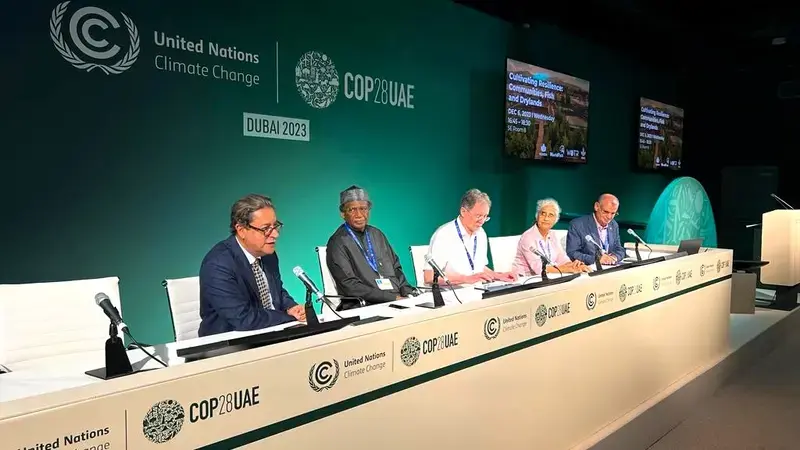
The UNFCCC 28th Conference of the Parties (COP28) took place in Dubai, the United Arab Emirates (UAE), from November 30 to December 12, 2023.
Located in the heart of the CWANA and the Middle East drylands during the hottest year in recorded history, COP28 held immense significance for ICARDA, CGIAR's drylands agricultural Research Center. Throughout COP28, ICARDA's delegation, alongside colleagues from sister centers, highlighted the importance of international collaboration in tackling climate-smart transformation in food, land, and water systems for future global food security, showcasing the role CGIAR can play. CGIAR's agrifood systems innovations and technologies gained significant attention at events and bilateral meetings with governments, partners and donors, and stakeholders such as the private sector.
CGIAR was encouraged to see that for the second year in a row, COP included the transformation of agrifood systems as a key objective in climate resilience and global food security. Not only this, but the Food, Agriculture, and Water Day, along with a general food systems theme apparent throughout the conference, demonstrated that world leaders and changemakers are waking up to the key role that food systems play.
Early on at COP28, a declaration on sustainable agriculture, resilient food systems, and climate action was issued and signed by 152 Heads of State and Government, recognizing the threats of climate change, emphasizing the potential of agriculture and food systems, and committing to specific objectives and actions to address these challenges.
On the 2nd of December, at a pledging event hosted by the UAE, key funders such as the Netherlands, United Kingdom, United States of America, Norway, and USAID pledged USD 890 million to support CGIAR's innovations. The pledges followed the USD 200 million partnership announcement to Accelerate Action on Climate and Strengthen Food Systems Through Investment in Agricultural Innovation by H.E. Mariam Almheiri, UAE Minister of Climate Change and Environment, and Bill Gates. This strong start set the tone for taking climate-smart agriculture seriously throughout COP28.
In addition, the United Nations Food and Agriculture Organization (FAO) unveiled its groundbreaking $30 million Water Scarcity Initiative to enhance coordination and collaboration among various stakeholders in the pursuit of water security and food security.
ICARDA joined sister research centers at the COP28 Food Pavilion, co-convened by CGIAR, the United Nations Food and Agriculture Organization (FAO), the Rockefeller Foundation, and the International Fund for Agricultural Development (IFAD) featuring 12 days of a packed events schedule, focusing on building foundations and partnerships, developing pathways forward, and raising awareness of CGIAR innovations towards rural communities resilience within sustainable climate action.
On her first day as CGIAR Executive Managing Director, Dr. Ismahane Elouafi joined COP28, engaging in over 100 events over the two weeks and putting food systems at the center of the climate agenda.
Aly Abousabaa, Director General, ICARDA, and CGIAR Regional Director for CWANA, also met with ministers and key stakeholders at multiple high-level events, including the "Ministerial Committee of Partners of the AWARe Initiative" meeting, which brought together 13 ministers who highlighted the progress made since the first steering committee for the AWARe initiative during the 6th Cairo Water Week last October. Abousabaa supported initiatives and provided key strategic input on how ICARDA's dryland innovations can support regional food, water, and agriculture goals.
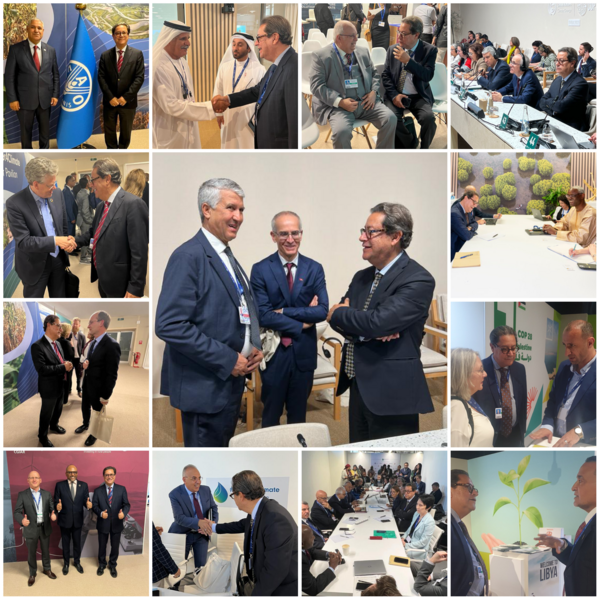
CGIAR's presence at COP28 was marked by significant contributions and impactful initiatives to address pressing global challenges. CGIAR demonstrated its commitment to finding solutions for climate change, food security, and sustainable livelihoods through innovative programs and collaborations. While acknowledging COP shortcomings, we recognize them as opportunities for collective action. Together, we can bridge gaps, strengthen partnerships, and drive meaningful change to transform food systems across CWANA and beyond.
In all, ICARDA convened, co-convened, and participated in 25+ strategic events to help CGIAR centers collaborate in the region, and this included a field day for partners, stakeholders, and sister centers where ICARDA showcased a pioneering initiative, the Integrated Desert Farming Innovation Program (IDFIP), that aims to turn barren deserts into food production powerhouses. IDFIP is based on a recyclable system where innovations such as crops, aquaculture, and protected agriculture (net houses) are integrated symbiotically to recycle water, use waste for fertilizer, and reduce water and energy use by up to 80%.
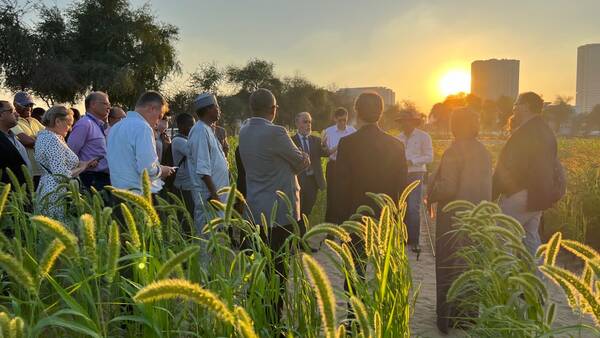
ICARDA'S EVENTS AT COP28
ICARDA, WOTR, and WorldFish hosted an official UNFCCC side event to discuss integrated innovation packages, including circular economies, crop-aquaculture systems, and sustainable water and energy use to optimize productivity and minimize environmental footprints. Successful dryland innovation cases from India, North Africa, and the Middle East were showcased, emphasizing community inclusion and locally-led adaptation.
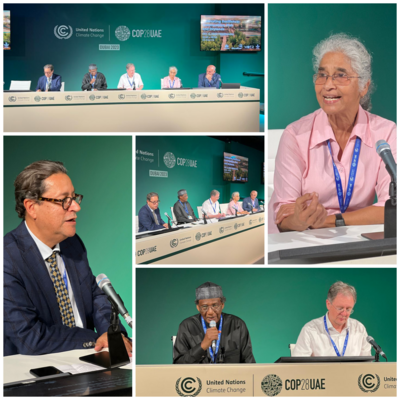
"At community and farmer level, we find ourselves hindered by the sectoral nature of organizations, governments, private sector. Silos need to be overcome to reach the sustainable objectives of communities." - Marcella D'Souza, Director, WOTR.
ICARDA and IWMI contributed to the global dialogue on sustainable agriculture, water management, and food security, fostering knowledge sharing and networking while proposing policy tools and interventions.
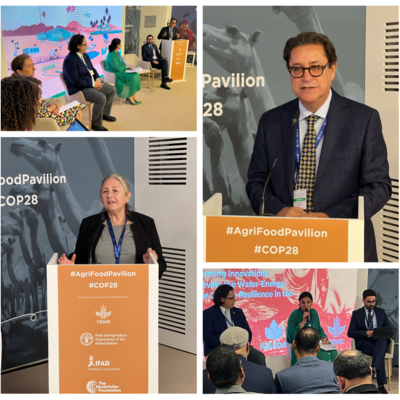
"Integrated farming approaches include community-based arrangements because of the diversity of people living side by side, their needs, and their abilities at different levels." - Dina Saleh, Regional Director, IFAD.
ICARDA and AOAD hosted a high-level regional dialogue that addressed multifaceted challenges through comprehensive solutions integrating food security, development, and climate adaptation strategies, showcasing on-ground actions to transform agrifood systems for climate resilience in fragile contexts.
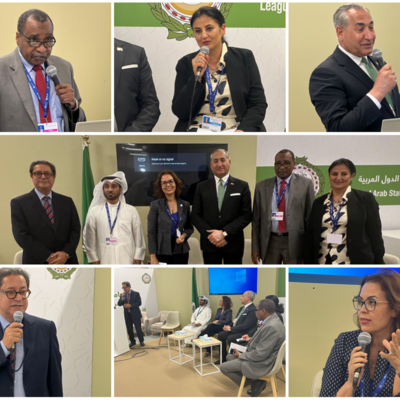
"Transforming agriculture-food systems is a necessity. We each have our mandate, but collaborations and collective action is the only way forward for such a complex scenario." - H.E. Prof. Ibrahim AlDukheiri, Director General, AOAD.
ICARDA and Alliance of Bioversity International and CIAT session explored the youth's involvement in climate change mitigation and adaptation in the Global South, focusing on two key areas: building research capacity and shaping climate action policies.
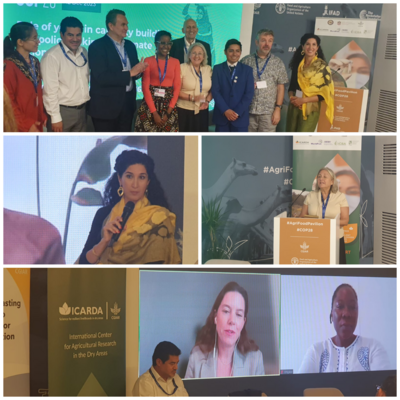
"For a long time, agriculture was thought of as the domain of the public sector, but we can now say that the private sector can step in by really engaging the youth and helping to develop future leaders." - Samantha Kayruz, Head of Strategy and Sustainability Impact, Goumbook.
In this panel discussion, Director Generals of ICARDA, IFPRI, IWMI, and WorldFish provided introductory remarks, followed by presentations highlighting key innovations and programs that showcase a few of how we are working to leverage our capabilities and tackle some of CWANA's most pressing challenges by delivering tangible benefits to marginalized stallholder farming communicates across CWANA.
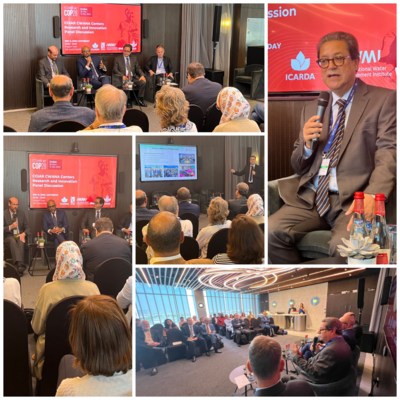
"Exciting synergy with CGIAR sister Research Centers can tackle CWANA challenges head-on. OneCGIAR's collaborative work on water, policy, fragility, and aquaculture shows how combined expertise and partner support is the future." – Aly Abousabaa, Director General, ICARDA, and CGIAR Regional Director for CWANA.
In addition, the ICARDA delegation participated in many events throughout the conference, showcasing how CGIAR's global agri-research expertise could be leveraged for global adaptation and mitigation of agri challenges stemming from intensifying climate change.
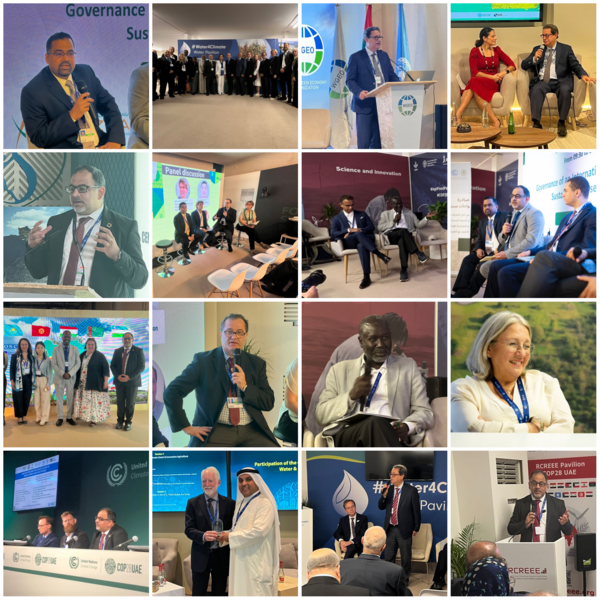
ICARDA also hosted a CGIAR Board meeting that united ICARDA's board of trustees, fostering candid discussions, ironing out details, and leveraging each member's expertise. Together with CGIAR, we move forward for resilient dryland livelihoods.
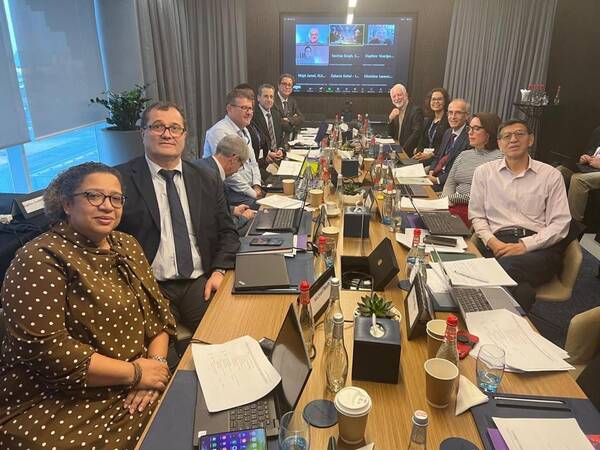
The ICARDA delegation at COP28
- Aly Abousabaa, ICARDA Director General and CGIAR CWANA Regional Director
- Neal Gutterson, Board Chair
- Roula Majdalani, Senior Climate Change Advisor
- Michael Baum, Acting Deputy Director General, and Research Team Leader
- Abdoul Aziz Niane, Regional Coordinator of the Arabian Peninsula Research Program
- Vinay Nangia, Soils, Water, and Agronomy Research Team Leader
- Ajit Govind, Senior Climate Scientist and Systems Modeler
- Garrick Long, Special Advisor to the Director General
- James Pursey, Senior Communications Manager
- Mahmoud Khedr, Partnerships and Engagement Officer
